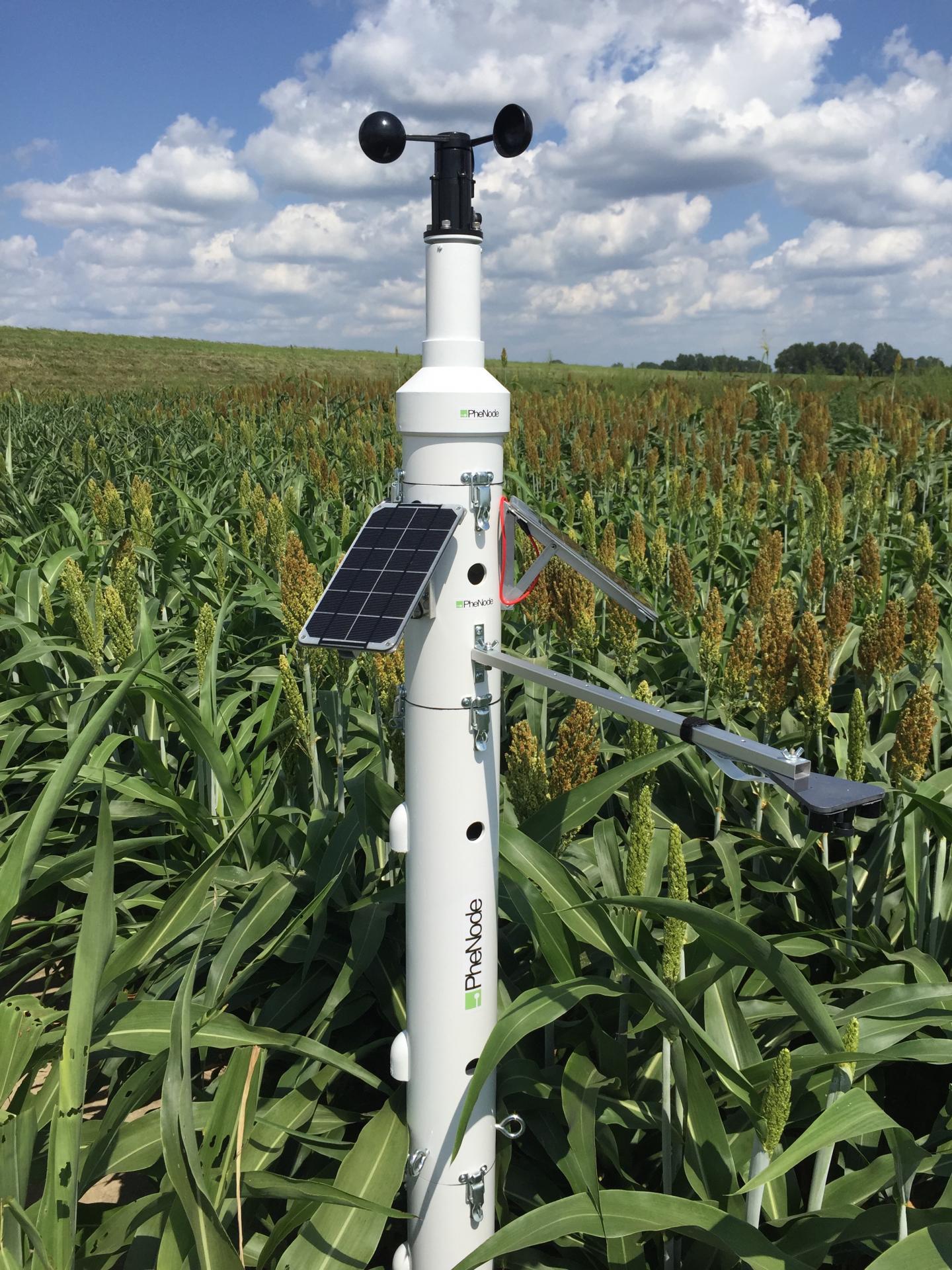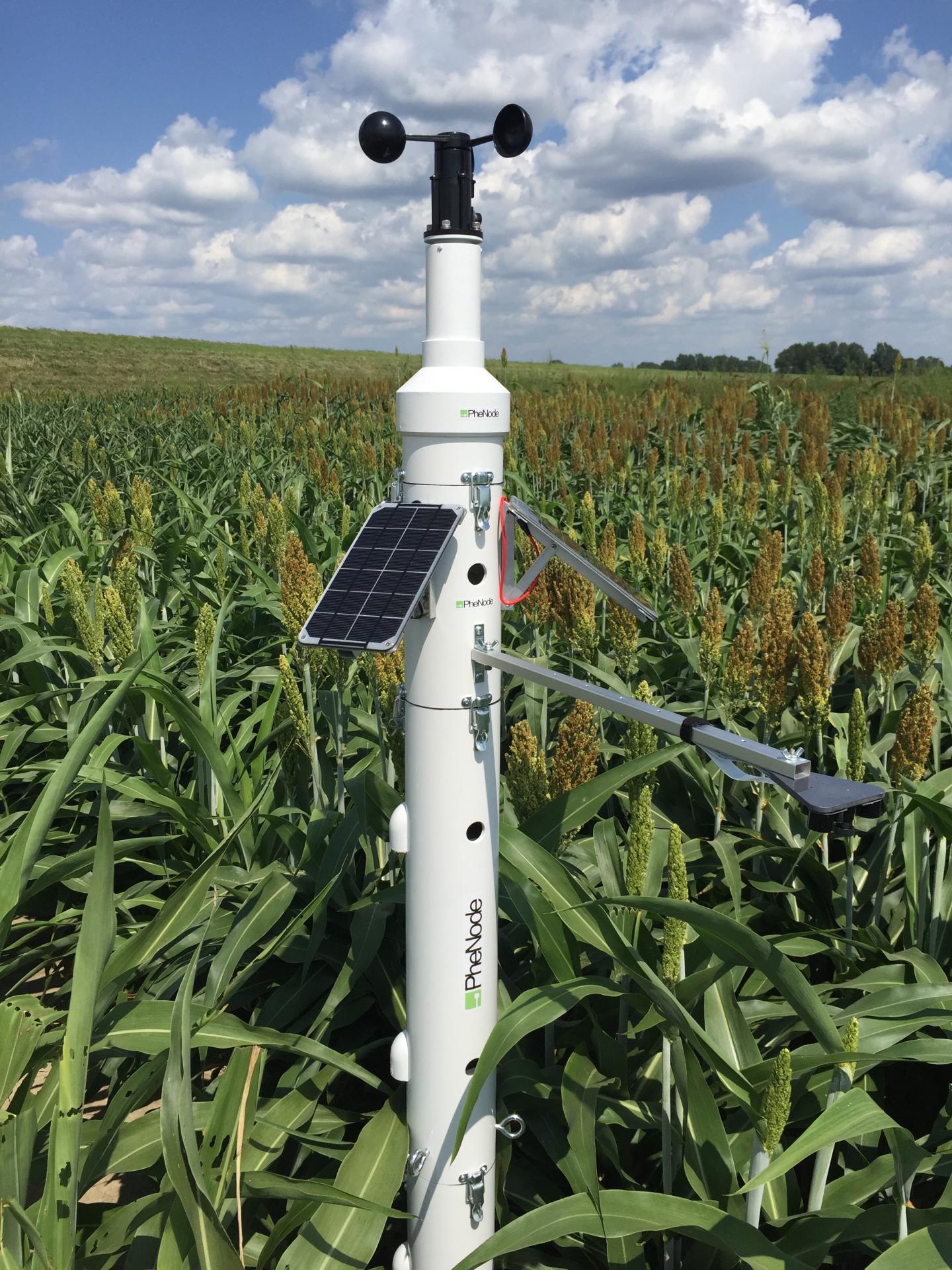
Credit: Donald Danforth Plant Science Center
Researchers at the Donald Danforth Plant Science Center, a not-for-profit research institute with a mission to improve the human condition through plant science, are leveraging expertise in crop phenotyping with the development of the PheNode, a 'smart', farm-ready, solar-powered environmental sensor and phenotyping station for crops.
"With a suite of diverse sensors on the PheNode, we can continuously monitor field crops for growth rate, stem diameter, height, leaf shape, leaf angles, canopy closure, light interception and the relationship of these traits to enhanced canopy photosynthesis. The PheNode will help crop science innovators to identify ideal canopy architectural and leaf metabolic features to breed crops for increased yield," said Nadia Shakoor, Ph.D., research scientist in the Todd Mockler laboratory. "We see a need for more sustainable crop production with minimal water and energy inputs, and a need to anticipate changing environmental conditions, like elevated CO2 levels, that will affect farming." The prototype was developed by Shakoor, Mockler and colleagues, and was recently highlighted at the 2016 Ag Innovation Showcase and SXSW Eco in Austin, Texas.
Modular sensors and cameras on the PheNode take real-time measurements of temperature, humidity, CO2, rainfall, air quality, wind speed, light quantity and quality, soil moisture, soil temperature, pH and nutrient composition. The PheNode allows researchers, breeders and farmers to monitor directly within the plant canopy, providing crucial information for both crop improvement and precision agriculture.
"Direct canopy measurements are particularly challenging due to inherent difficulties in taking the measurements, high levels of temporal and spatial variation, and an inability to generalize local measurements to the landscape scale," continued Shakoor. "The PheNode provides growers with an affordable and comprehensive crop phenotyping system that will provide a snapshot into a crop plant's environment."
A modular minirhizotron system is incorporated into one version of the PheNode to take images of crop roots in the soil, allowing observation of root growth and development in real time. The PheNode is powered by a solar panel with a backup battery, and all sensor data is stored locally and transmitted via Bluetooth or WiFi. phenode_11_1
Development of the PheNode is part of a larger effort at the Danforth Center to take discovery from the laboratory to the marketplace. "The PheNode uses quite sophisticated imaging and sensor technology that we use in advanced research to understand how plants work," said James Carrington, Ph.D., president of the Danforth Center. "Delivering it to the farm will help growers make better decisions to manage their crops, reduce their environmental footprint and costs."
"When the PheNode was presented in front of investors, farmers and the industry at Ag Innovation Showcase, we received positive feedback and found a niche market demanding a product like this in the field," said Mockler. "The positive feedback validates the investment of the Department of Energy's ARPA-E, the TERRA program which has partially supported PheNode development. The next phase for the PheNode is aligning with investors who seek to impact agriculture by giving farmers and breeders the ability to have and use vital information at their fingertips."
###
About The Donald Danforth Plant Science Center
Founded in 1998, the Donald Danforth Plant Science Center is a not-for-profit research institute with a mission to improve the human condition through plant science. Research, education and outreach aim to have impact at the nexus of food security and the environment, and position the St. Louis region as a world center for plant science. The Center's work is funded through competitive grants from many sources, including the National Institutes of Health, U.S. Department of Energy, National Science Foundation and the Bill & Melinda Gates Foundation.
To keep up to date with Danforth Center's current operations and areas of research, please visit, http://www.danforthcenter.org, featuring information on Center scientists, news and the "Roots & Shoots" blog. Follow us on Twitter at @DanforthCenter.
Media Contact
Melanie Bernds
[email protected]
314-587-1647





